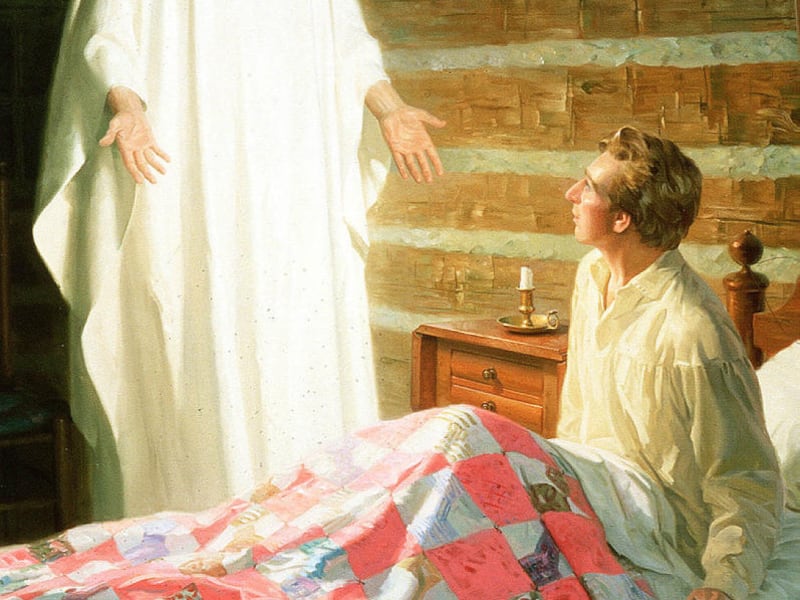Joseph Smith’s birthday, Dec. 23, falls on a Wednesday this year. As always, it will be lost amid the shopping and celebrations just before Christmas Eve. This is appropriate for at least two reasons: First, members of The Church of Jesus Christ of Latter-day Saints worship Jesus Christ, not Joseph, and don’t want to suggest otherwise. Second, prophets point beyond themselves to Jesus Christ; to focus on the signifier rather than on the signified would be seriously mistaken.
Still, I would like to say a word about Joseph.
On the evening of Sept. 21, 1823, an angel appeared in the Smith family cabin south of the village of Palmyra, New York.
“He called me by name,” Joseph Smith later recalled, “and said unto me that he was a messenger sent from the presence of God to me, and that his name was Moroni; that God had a work for me to do; and that my name should be had for good and evil among all nations, kindreds, and tongues, or that it should be both good and evil spoken of among all people” (Joseph Smith — History 1:33).
At the time, this prophecy must have seemed absolutely ludicrous to virtually anybody who heard it. Young Joseph was the barely literate teenage son — the fifth of 11 children — of a very poor farming family on the American frontier. His surname is the most common in the English-speaking world.
And yet, it has been fulfilled.
Temples stand today, with authority and ordinances restored through Joseph Smith, in Ukraine, Ghana, Japan and Brazil. Another is rising just outside of Rome.
Many years ago, I visited a monastery in the hills north of Beirut. Sitting in the office of the monastery’s abbot, I noticed a copy of the Book of Mormon, which Joseph Smith translated, sitting on his bookshelf. Years before that, I visited a Christian bookstore in Nairobi, Kenya, seeking a Bible in Swahili. I bought my Bible, but I also noticed three shelves of anti-Mormon books — more books, perhaps, than there were Latter-day Saints in all of East Africa at the time. It seemed oddly flattering but also was a fulfillment of Moroni’s prophecy. Today, we have a Kenyan general authority.
Elder John H. Groberg, writing of his experiences as a youthful missionary in the South Pacific, recalls a remote island where the natives didn’t recognize titanic political figures of the day, such as Dwight D. Eisenhower and Charles de Gaulle, but had been told by their pastor about Joseph Smith — an instance, in this case, of Joseph’s name being “evil spoken of.”
“The ends of the earth shall inquire after thy name,” Joseph was told while languishing in Liberty Jail in 1839, “and fools shall have thee in derision, and hell shall rage against thee” (Doctrine and Covenants 122:1).
I’m writing from Istanbul, Turkey, a marvelous city once known as Byzantium and then, for roughly 1,500 years, as Constantinople. My wife and I attended church here on Sunday. The services were conducted in Turkish by Turks. Several Turkish-speaking American missionaries were present; a mission was established here earlier in the summer. The closing hymn (“High on the Mountain Top”), sung in Turkish, celebrated the Restoration of the gospel. The postlude was “Yusuf Peygamber’e Selam Olsun” (“Praise to the Man”). Leafing through the small Turkish hymnal, I noticed, among other things, “Yusuf Smith’in Ilk Duasi” (“Joseph Smith’s First Prayer”).
Remarkably, an ordained apostle had recently visited the branch. Thus, nearly 2,000 years since the apostle Paul made his headquarters in Ephesus, not far south of Istanbul, apostles are again visiting Anatolia. Moroni’s seemingly improbable prediction is being fulfilled here, too: These missionaries and apostles come as witnesses of Jesus Christ, but they also carry the name of Joseph Smith.
In the Old Testament, God directed the prophet Elijah to put an end to a lengthy drought. As recounted in 1 Kings 18:42-45, Elijah climbed to the top of Mount Carmel, prayed and then told his servant to go and look toward the Mediterranean. Could anything be seen? There was nothing, the servant said. “Go again,” said Elijah, “seven times.” On that seventh time, the servant reported that “there ariseth a little cloud out of the sea, like a man’s hand.” Shortly thereafter, a heavy rain pounded the parched land.
So, too, in our day, does the Restoration of the gospel, launched through Joseph Smith, bring relief from long drought — and it does so, more and more, worldwide.
Daniel Peterson teaches Arabic studies, founded BYU’s Middle Eastern Texts Initiative, directs MormonScholarsTestify.org, chairs mormoninterpreter.com, blogs daily at patheos.com/blogs/danpeterson and speaks only for himself.


